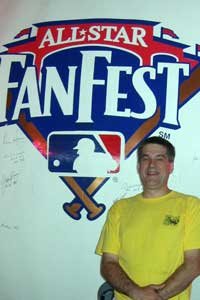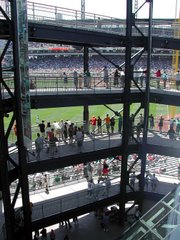Baseball always has been a game of statistics, but the sport's adherents have really kicked it up a notch in my lifetime.
Simple numbers such as wins and losses, hits and runs, walks and strikeouts have been expanded to include a vast array of analytical minutiae, breaking it down pretty much to every pitch that's thrown.
The analysis has extended beyond the players, themselves, to the men who call the shots during the games. Until recently, all we had to go on when judging a manager's performance was how many victories his teams scored. Such simple glances, of course, tend to favor managers who take over star-studded teams, while pilots of squads lacking talent tend to suffer (and pay for it with their jobs).
Recent number-crunching a cabal of researches led by John Thorn and Pete Palmer has led to the publication of several editions of Total Baseball, which includes a calculation of "expected wins" for each team each season "based on its actual runs scored and runs allowed." The difference between actual wins and "expected wins" serves as a gauge of sorts for the effectiveness of a managing job.
I looked up Hall of Fame managers for their comparative Actual Wins Minus Expected Wins, as listed in Total Baseball, and came up with this list:
1. Hugh Jennings (1907-20, 24-25) +29.9, avg +1.9
2. Earl Weaver (1968-82, 85-86) +29.9, avg +1.8
3. Frank Chance (1905-14, 23) +20.4, avg +1.8
4. Al Lopez (1951-65, 68-69) +28.3, avg +1.7
5. Walter Alston (1954-79) +36.8, avg +1.6
6. Bill McKechnie (1915, 22-26, 28-46) +37.0, avg +1.5
7. Clark Griffith (1901-20) +24.9, avg +1.2
8. Sparky Anderson (1970-95) +23.9, avg +0.9
9. Wilbert Robinson (1902, 14-31) +16.8, avg +0.9
10. Miller Huggins (1913-29) +13.5, avg +0.8
11. Red Schoendienst (1965-76, 80, 90) +6.2, avg +0.4
12. Frank Frisch (1933-38, 40-46, 49-51) +7.4, avg +0.4
13. Connie Mack (1894-96, 1901-50) +13.9, avg +0.3
14. Joe Cronin (1933-47) +3.7, avg +0.2
15. Frank Selee (1890-1905) -1.5, avg -0.1
16. Cap Anson (1875, 79-98) -2.9, avg -0.1
17. Casey Stengel (1934-36, 38-43, 49-60, 62-65) -4.8, avg -0.2
18. John McGraw (1899, 1901-32) -11.9, avg -0.4
19. Fred Clarke (1897-1915) -8.6, avg -0.5
20. Tom Lasorda (1976-96) -15.5, avg -0.7
21. Joe McCarthy (1926-46, 48-50) -23.6, avg -1.0
22. Bucky Harris (1924-43, 47-48, 50-56) -32.5, avg -1.1
23. Ned Hanlon (1889-1907) -30.3, avg -1.6
24. Harry Wright (1871-93) -39.7, avg -1.7
Actually, Weaver would have ranked No. 1 by a large margin had he not returned to manage the Orioles in 1985 and '86. His final season also was the first in which any of his teams compiled a sub-.500 actual record.
Jennings is one of several on the list who spent substantial time as a player-manager, joined by Chance, Frisch, Cronin, Anson and Clarke. I was kind of disappointed to see Clarke rank so low on the list. I'd always thought of him as perhaps the most successful combination of player and manager, but his early 20th-century Pirates teams just might have been record than their record would show. In several of those seasons, Chance's Cubs finished ahead of Pittsburgh, and in fact his Chicago teams of 1906-12 compiled the best seven-year record in baseball history.
You'll notice that Alston is far, far higher on the list than his better-known, louder-mouthed successor. I always wondered how Lasorda got into the Hall of Fame before Anderson. Obviously, the men who make such decisions were swayed by the Lasorda bluster and didn't read any Palmer-Thorn.
Stengel is in negative numbers, as you'd expect, because of his tenure with the fledgling New York Mets. According to Total Baseball, the legendarily awful '62 Mets should have won eight more games than they actually did, which still would have put them among the worst of all time. Apparently all the stories about Marv Throneberry and his talent-challenged teammates are true.
The biggest surprise on this list might involve another Yankee manager. McCarthy's teams won more than 60 percent of their games, but apparently they had the potential to win a whole lot more. Still, he never had a losing season in 24 years, and that should count for something.
As for the managers at the tail end, I've never been sure why Bucky Harris is in the Hall of Fame; I wondered why the Hall of Fame waited until Hanlon had been dead for six decades until inducting him; and despite Wright's awful showing here, he deserves high accolades for his pioneering efforts.
I haven't included active managers, but Bobby Cox and, to a lesser degree, Tony LaRussa have put up very impressive numbers, and both should be in Cooperstown someday. As for Joe Torre, much of his managerial success has come by way of a monster team payroll, but he was a pretty good player and a heck of a nice guy, so one day they'll have a plaque for him, too.
A quick look at non-Hall managers shows that the most inept of all time might have been Wislon, who racked up Actual Wins Minus Expected Wins of negative-31.8 in ine seasons while guiding the Phillies and Cubs through the Depression and into World War II. For what it's worth, the Cubs won their last National League pennant the year after they jettisoned Wilson.
Perhaps the best non-Hall AWMEW was compiled by the late Dick Howser, who scored a plus-23.4 in six full seasons. In his seventh, he was diagnosed with the brain cancer that killed him at age 51, less than two years after he guided the Kansas City Royals to their only World Series championship.
And just for the laughs, I looked up Joe Quinn, who took over the reigns for the 1899 Cleveland Spiders and guided them to a 12-104 (sic) record the rest of the way. According to AWMEW, the Spiders actually should have been 10-106 under his leadership.
Good job, Joe.
Sammy Sosa just hit his 600th career home run. Throughout most of baseball's history, that would have been big news.
Subscribe to:
Post Comments (Atom)









No comments:
Post a Comment